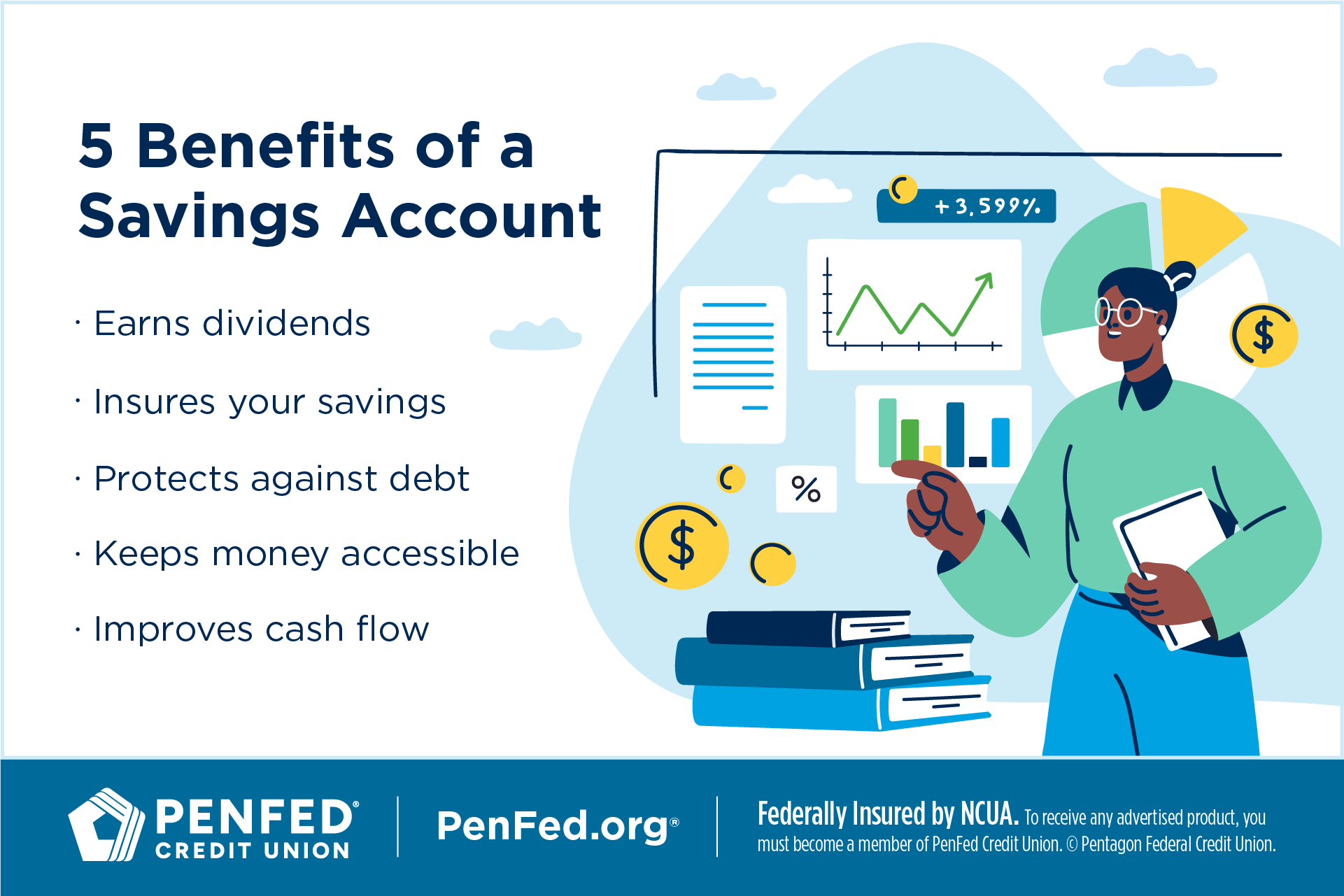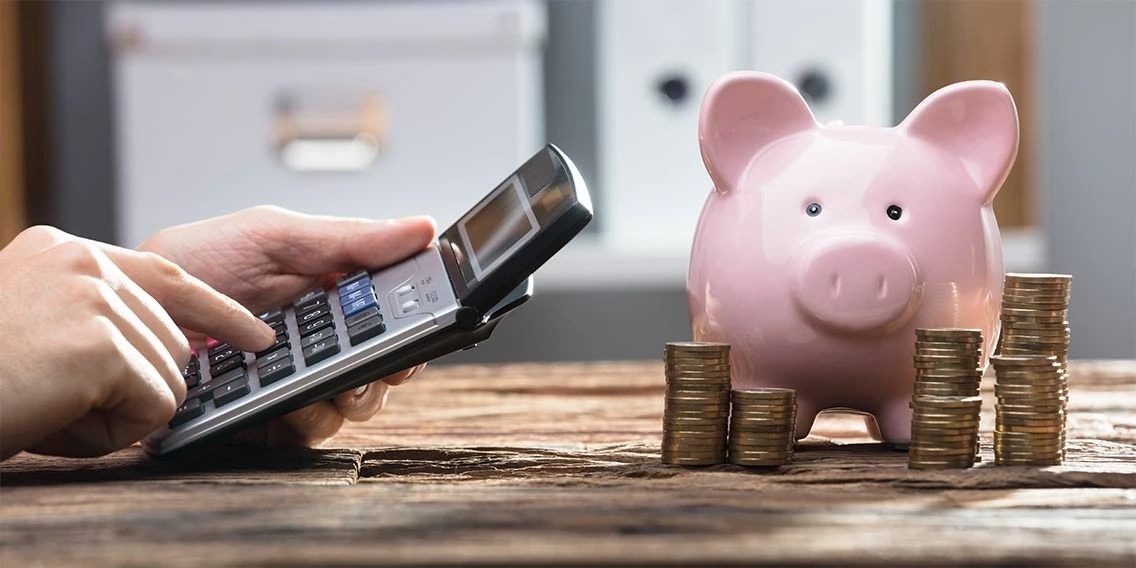CHECKING & SAVINGS
Is a Savings Account Worth It?
What you'll learn: How having a savings account can improve your finances
EXPECTED READ TIME: 10 minutes
Basic savings accounts may seem a little ho hum. But in the world of personal finance, the savings account is an unsung hero. So, here’s a rundown on the types of savings accounts you can choose from, how savings accounts stack up against other tools for saving, and why yes, you really do need one.

What Is a Savings Account?
A savings account is a financial tool that allows you to save money, often while earning interest on it. There are lots of benefits to savings accounts besides just being safe. Understanding how savings accounts work and the benefits they offer can help you manage your money more efficiently, and possibly even grow it faster.
There are three main types of savings accounts, each with its own benefits:
Regular savings accounts cost little (often nothing) to open and usually have very low minimum balance requirements. They usually offer the lowest interest rates, but you can easily move money from them to checking when you need to manage your cash flow.
High-yield savings accounts offer higher interest rates than regular savings accounts, but they may require a minimum balance or have a monthly limit on withdrawals.
Certificates of deposit (sometimes called CDs) and money market certificates work differently. You’re required to commit a minimum amount of money for a period of time (known as a term). During that term, your money will gain an interest rate that is often higher than regular and high-yield savings accounts, but you’ll have to pay a penalty if you access your money before your term has ended.
Depending on your savings goal, you may find that one type of account better fits your needs than the others. For instance, you’ll benefit the most from a higher interest rate if you don’t withdraw funds from your account frequently, so high-yield savings and certificates are better for long-term savings goals. On the other hand, a certificate may not be the best option for storing your emergency fund because of its early withdrawal penalty.
Understanding how savings accounts work and the benefits they offer can help you manage your money more efficiently.
Comparing Common Savings Account Types
Regular savings accounts, high-yield savings accounts, and certificates all have their pros and cons. You may find one account type better fits certain savings goals. This is how they stack up to each other.
|
|
Minimum Balance Requirement |
Interest Rate |
Access to Money |
Fees |
|---|---|---|---|---|
|
Regular Savings Account |
As little as $0 to open and maintain |
Low |
Easily transfer money in and out |
Usually does not have fees |
|
High-Yield Savings Account |
Varies by institution |
Higher than that of regular savings |
Usually limits number of monthly withdrawals |
May have monthly fees |
|
Certificate of Deposit |
Often $1,000 to open |
Higher than that of regular savings, sometimes higher than high-yield savings |
Money is locked in until maturity date |
May incur penalty for early withdrawal |
Benefits of Having a Savings Account
Along with checking accounts, savings accounts are fundamental to personal finance. Even if you don’t use your savings account often, having one carries many benefits.
The most obvious benefit of a savings account is that it earns interest. In simple terms, interest is money your bank or credit union pays you for storing your money with them. Credit unions use the term “dividends” instead, but it means the same thing. While the interest rate on your savings account might not seem like a big deal, over time those earnings can compound to be worth a lot.
Money in a savings account is often safer than money kept in your wallet, at home, or in investments.
Money in a savings account is often safer than money kept in your wallet, at home, or in investments. Savings accounts are insured by the Federal Deposit Insurance Corporation (FDIC) or National Credit Union Administration (NCUA) for up to $250,000 per account owner, and money in them can’t be lost, stolen, or accidentally spent. When you put money in savings, you know it will be there when you need it.
Savings accounts can also help you avoid debt. Many people choose to store their emergency fund in a savings account so the fund continues growing. They’ll be able to transfer their money to checking quickly if they need it, and the amount in their account won’t change based on market fluctuations.
How Many Savings Accounts Should I Have?
There’s no limit to the number of savings accounts you’re allowed to have. Many people have multiple accounts so they can keep their emergency funds separate from other savings, or so they can separate long- and short-term savings. It’s usually recommended you don’t open a savings account unless it has a specific purpose.
There’s no limit to the number of savings accounts you’re allowed to have.
How Much Money Should I Keep in Savings?
This depends on the purpose of your savings account. If you’re saving for something specific — like a vacation or down payment — then you need to save enough in your account to reach that goal. Emergency funds need to have enough money to cover your essential expenses for between 3 and 9 months. The exact time period will be specific to your financial situation.
Long-term savings are different because you may not have a specific savings goal. For instance, if you’re contributing to a high-yield savings account as one part of your retirement plan, then you may set a weekly or yearly savings goal and also add extra funds when you have them.
Keep in mind, though, that there are situations in which you might be putting too much into savings. Your savings account is only insured for up to $250,000 per institution, per account ownership category. So, if you’ve hit that limit, your extra savings funds won’t be insured unless you open a new account at a different credit union or bank.
It’s also possible you could be missing out on other investments with higher returns. Once you’ve filled your emergency fund and met other short-term savings goals, it’s time to invest in other assets.
Is There a Downside to Having a Savings Account
There are a few downsides to savings accounts. Interest rates can fluctuate on regular and high-yield savings accounts, meaning you won’t be able to predict your long-term savings balance like you would with a certificate. You could end up earning less than you anticipated.
Minimum balance requirements can be another problem. You may not receive the highest interest rate available on your account — or may lose money to penalties — if you fall below that balance requirement.
Some banks charge fees on savings accounts. Fees can vary a lot from one financial institution to another, so it’s important to shop around before opening an account. Fees are common for:
Overdrafts
Debit card access
ATM access
Wire transfers
Excessive monthly transactions
Fees can vary a lot from one financial institution to another, so it’s important to shop around.
Another consideration is that interest earned on savings accounts is taxable, whereas taxes on earnings from retirement accounts, for example, are generally much lower. Of course, you’ll likely be penalized for withdrawing funds early from a retirement account, so there’s a trade-off.
Despite these downsides, most people find the benefits of savings accounts outweigh the consequences. You can also minimize these negatives by comparing accounts from different financial institutions and choosing the one that best fits how you plan to use your savings account.
Factors to Consider When Opening a Savings Account
You’ll get the most from your savings account if you choose one that works in a way that meets your needs. Thankfully, there are lots of options to choose from. Most financial institutions will offer a few types, but even the same type of savings account can be slightly different from one bank to another. Here are some things to consider when opening a savings account:
Minimum Balance Requirements
Banks and credit unions often set minimum balance requirements, especially for accounts with higher rates. If you can’t maintain that balance, you could lose your savings to fees and penalties. Choose an account with a minimum balance you can comfortably meet, even if the account offers a lower rate.
Remember, you can open an account with a lower rate, build up your balance, and later convert your account or open a new one to score the higher rate you want. Saving is all about the long game.
Choose an account with a minimum balance you can comfortably meet, even if the account offers a lower rate.
Interest Rate and APY
Interest rates grab our attention, but don’t forget to check the Annual Percentage Yield (APY). An APY gives an estimate of what you’ll earn on your account in one year, including any compounded interest. Two accounts might offer the same interest rate, but if one compounds more frequently, it will earn more over one year than the other account will.
Fees and Charges
While most savings accounts come with maintenance fees, it is possible to find a free savings account. It’s also possible to find savings accounts that allow more withdrawals and transfers from your account. Of course, usually the cost of that flexibility is a lower interest rate — but that may not be a concern for you depending on what you want out of your account.
Find out what other fees might be included with your account. Some, like ATM access fees, may not matter, depending on how you use your account. But you never want to be surprised with a charge you could have avoided.
If you already have a checking account with a bank or credit union, find out if opening your savings account there offers any perks. For instance, some financial institutions offer free transfers between internal accounts, or you might be able to link your savings to your checking account to provide overdraft protection at no extra charge.
Your Savings Goal
As we already mentioned, it’s important that each of your savings accounts has a clear goal. Think about the purpose of your account and how you plan to use it while exploring your options. That way, you can prioritize the features that matter most to you.
Alternatives to Savings Accounts
Savings accounts aren’t the only game in town, and some alternative accounts offer great benefits that could better suit your situation. Here are some of the main alternatives to savings accounts:
Certificate Accounts
Technically, a certificate account is a type of savings account, but it works very differently from traditional and high-yield accounts. Basically, you agree to leave your money in the certificate for a certain length of time (called a term) in exchange for a higher interest rate. When your certificate matures — meaning your term has ended — you can open a new certificate or move your money to a different account.
Certificates are great when you’re saving for a long-term goal. Your interest rate is locked in for the length of your term, so when you open your account you know exactly what it will be worth at maturity. Because your money is locked in, you won’t be tempted to spend it either.
The downside is that money in a certificate isn’t easy to access in an emergency. Plus, longer terms — which usually offer the highest interest rates — don’t always keep up with inflation. If interest rates rise while your money is in a certificate, you won’t benefit from the higher interest rate. However, a good certificate investment strategy can help you maximize the value of your certificates over time.
Money Market Savings Accounts
Money market savings accounts offer higher interest rates like a certificate, but with the flexibility of a checking account. They often come with a debit card and ATM services, making it easier to spend from savings when you want to.
Of course, you may be more tempted to spend from savings when it’s easier, and these accounts can come with more and higher fees. Often, they limit your monthly transactions, and the minimum balance requirement can be high. But for people with higher balances, they offer winning versatility.
Money market savings accounts are federally insured at each institution in the same manner as checking and savings accounts, up to a total $250,000 per person, per financial institution.
IRA
An individual retirement account (IRA) is an account where you can save money for retirement. While there are many types of IRAs, they fall into two categories:
Traditional IRAs offer tax-free growth by allowing you to save pre-tax income to invest and grow. You’ll pay tax on this money during retirement when you start drawing it.
Roth IRAs allow you to save post-tax income to invest and grow. Because you’ve paid tax on this money before you invest it, you won’t need to pay tax on it in retirement when you begin drawing it.
Earnings on retirement accounts are taxed differently than earnings on other types of investments. This tax advantage makes retirement accounts an excellent option for long-term savings goals.
You can access funds in an HSA before age 65 as long as you use the funds for qualified medical expenses.
Health Savings Account (HSA)
Similar to an emergency fund, an health savings account (HSA) lets you save money for unexpected health expenses. But similar to a retirement account, the money you put into your HSA is tax-deferred and tax-deductible.
You can access funds in an HSA before age 65 as long as you use the funds for qualified medical expenses — or you can withdraw them at a 20% tax penalty. After 65, you can withdraw from your HSA for any reason and pay regular income tax on that amount.
Investments
The term “investments” refers to many different assets you can put money into that (hopefully) will increase in value over time. These could include land, real estate, stocks, bonds, index funds and ETFs — even things like antiques or fine art.
Some investments, like bonds, grow slowly with little risk, while others grow more quickly but with much more risk. Most experts suggest determining your risk tolerance, starting slowly, and investing in a variety of assets.
Many people do well managing their own investments, but it does take time and research. You can get started with a brokerage account and stick to easy instruments like index funds and ETFs that generally trend upward over time. Another option is to work with a financial advisor to build a strategy customized for your needs.
The stability and flexibility of a savings account is hard to beat.
Tips for Maximizing Your Savings Account
Other savings tools may offer higher interest rates, but the stability and flexibility of a savings account is hard to beat. And with a solid savings strategy in place, you can get a lot out of your savings account. Here’s how:
Automate Your Savings
You’re more likely to save regularly if you don’t even have to think about it. Use direct deposit or set up automatic transfers from checking to ensure money goes into your savings every payday. You’ll get used to living without that amount, and you’ll have it in savings before you forget or temptation strikes.
Use direct deposit or set up automatic transfers from checking to ensure money goes into your savings every payday.
Set a Savings Goal
Knowing what you’re saving for is a big incentive to actually save. Use a spreadsheet or app to track your progress and stay motivated. Set calendar reminders to check in regularly and find ways to celebrate savings milestones.
Regularly Review Your Budget
Saving should be a line in your budget, not just what happens when you have something leftover after bills are paid. It’s good practice to review your budget at regular intervals — weekly, monthly, or quarterly depending on your needs. When you review your budget, look for ways to cut costs and save more.
Is a High-yield Savings Account Worth It?
If you can maintain the minimum required balance, a high-yield savings account could increase your savings balance a lot. After all, the rate on a high-yield account is often 10 to 20 times higher than that of a regular savings account. With compound interest, the difference over ten years could be substantial.
Let’s look at an example. Say you open a savings account with $500 and continue contributing $50 at the end of each month. The account offers an interest rate of 0.25% compounded monthly. In ten years, you would have saved $6,500.00 and earned $87.64 in interest, for a total of $6,587.64.
How much more would you earn with a high-yield account? Assume everything stays the same, except this time your account has a rate of 4.00%. Now at the end of ten years you’ll have earned $1,607 in interest, for a total of $8,107.91.
If you can maintain the minimum required balance, a high-yield savings account could increase your savings balance a lot.
How to Open a Savings Account
Once you’ve done your homework and compared different accounts and financial institutions, opening a savings account is simple. Again, be sure to look at the APY (not just the interest rate), consider any fees, and make sure the bank or credit union has positive reviews.
Next, get your paperwork together. Different institutions may require different documentation, but generally you’ll need:
A government-issued ID such as a driver’s license or passport
Your Social Security number
Proof of address
Phone number and email address
Many banks and credit unions allow people to open savings accounts online, but you can open an account in person at a local branch if you prefer. Make sure you have your opening balance ready to deposit.
Once your account is open, set up your account online or through the financial institution’s mobile app so you can easily manage your account. You’ll likely need access through their website or app to view your balance, move money, set up automatic transfers, and track your savings progress. Be sure you store your login credentials safely.
The Takeaway
A savings account is the Swiss Army knife of financial tools. Whether you’re looking to improve cash flow, warding off debt, or building for the future, the right savings account will get you there.
Explore Your Savings Options
Discover the diverse offering of products, services, and support available to our members.




